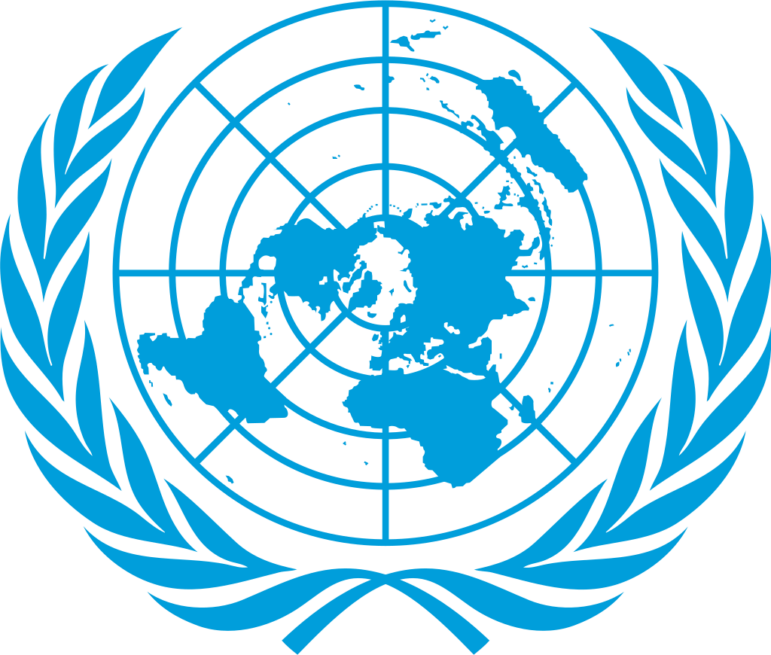NEW YORK – In a month when 115 known sacred sites were damaged by Russian attacks on Ukraine, particularly recently in Odesa, the United Nations Security Council has taken the unprecedented step to affirm and advance religious freedom, promote gender equality and, hopefully, improve social cohesion worldwide. The resolution goes further stressing the importance of interreligious dialogues as necessary for peaceful coexistence.
On June 14, 2023, The Security Council unanimously adopted UN resolution (UNSCR) 2686. As a reminder, The United Nations Security Council (UNSC) is one of the six principal organs of the United Nations (UN) and is responsible for maintaining international peace and security. The Security Council oversee peacekeeping operations as well as engages in “preventive diplomacy” to address potential conflicts and disputes before they escalate into crises.

UN Emblem
UNSCR 2686 expresses “deep concern at instances of discrimination, intolerance and extremism, manifesting in the form of hate speech or violence based on race, sex, ethnicity or religion or belief,” urging Member States to publicly condemn such actions while also encouraging them to prevent the spread of misinformation, disinformation, intolerant ideology, and incitements of hatred. It recognizes religious freedom as a human right and a necessary ingredient for a “durable peace” and the creation of a thriving society.
The resolution was co-introduced by the United Kingdom and the United Arab Emirates and passed despite Security Council permanent members Russian and China who have each been criticized internationally for their own records promoting religious freedom. It represents the first time the Council has consented to a specific statement addressing religious liberties.
The resolution does not mention ethnic and folk religions specifically. It did mention antisemitism, Christianophobia, and Islamophobia leaving others under terms like “the diversity of religions and beliefs” and “other forms of intolerance.”

United Nations Security Council on the United Nations Headquarters in New York City [Photo Credit: Neptuul CC-ASA 3.0]
Surprisingly, the resolution further mentions gender inequality. It urges Member States to promote women’s full, equal, meaningful, and safe participation and leadership at all levels of decision-making, in efforts to promote tolerance, sustainable and inclusive peace, and to strengthen social cohesion and community resilience, as well as women’s economic empowerment and gender equality.” It then reaffirms “the role of women’s leadership in prevention and resolution of conflict and their contribution to preventing the spread of intolerance and incitement to hatred.”
The document calls on Member States to address economic and educational harm against women. It also notes the harm that can occur via social media platforms.
UK’s Ambassador James Kariuki said in his speech to the Security Council “Freedom of religion or belief, including the freedom not to have a religion, is a fundamental human right. And yet, religious minorities have time and again been specifically targeted, including in conflict.”
“From the Yazidis in Iraq, to the Rohingya in Myanmar, to the recent case of the Baha’i in Houthi-controlled areas of Yemen, minorities are too often targeted on the grounds of religion or belief. Indeed, there is evidence that religious or belief minorities may avoid seeking humanitarian aid due to fear or intolerance. Including Sunni Muslims in Syria, Shi’a Hazara communities in Afghanistan, and Christian communities in Nigeria,” he added.
Ambassador Lana Zaki Nusseibeh United Arab Emirates said “The values of tolerance and peaceful coexistence are the foundation upon which lasting peace must be built.” The UAE became president of the UN Security Council in June 2023, noting that human fraternity, climate change, peace and security, and cooperation between the United Nations and the Arab League would serve as guiding priorities for its leadership.
“Stifling human rights is counterproductive to the vision of peace and security that we, as the members of the Security Council, seek to advance,” said Ambassador Jeffrey DeLaurentis of the USA. He then noted that the USA will stand with like-minded Council members in ensuring that the resolution is not misused to justify any human rights violations nor the repression of human rights defenders; women and girls; and lesbian, gay, bisexual, transgender, queer, questioning and intersex (LGBTQI+) persons. The resolution does not mention LGBTQI+ persons or communities.
Malta and Switzerland both highlighted the rise of extremism. Matla specifically points out that the intersection of gender and extremism results in overlapping discrimination and acts of hatred.
Switzerland, though supporting the resolution noted however that without the word “violent” terms like “extremism” may be subject to interpretation. Swiss ambassador Adrian Dominik Hauri noted that freedoms of religion and expression in no way authorized racism.
As with all resolutions from the United Nations, its force rests with the Member States’ resolve to create change. Without the commitment of national governments, what moral authority the resolution may have is weakened without actions.
Still, the new resolution brings attention to the issue of religious freedoms worldwide creating a mandate to the Security Council for actions where hatred, abuse, and violence. Ambassador Kariuki noted “When communities come under attack in situations of conflict, it is the role of this Council to address it.
The Wild Hunt is not responsible for links to external content.
To join a conversation on this post:
Visit our The Wild Hunt subreddit! Point your favorite browser to https://www.reddit.com/r/The_Wild_Hunt_News/, then click “JOIN”. Make sure to click the bell, too, to be notified of new articles posted to our subreddit.
